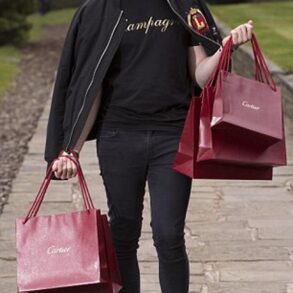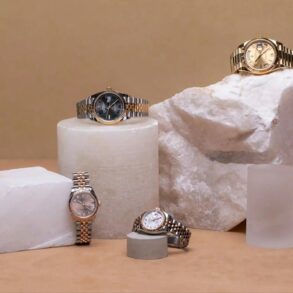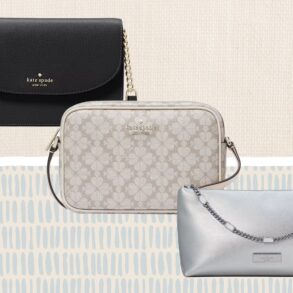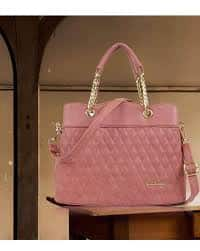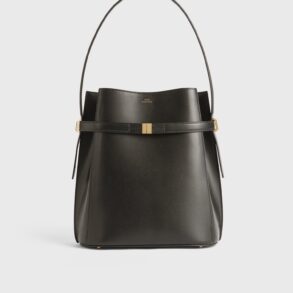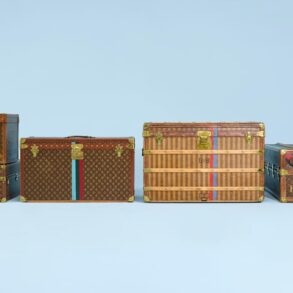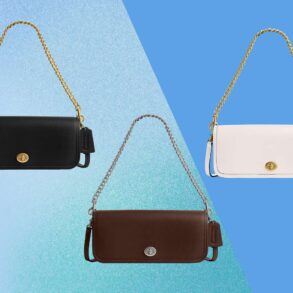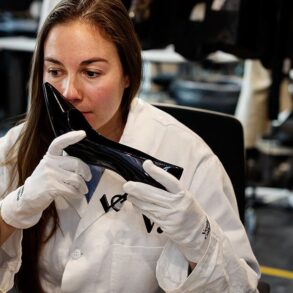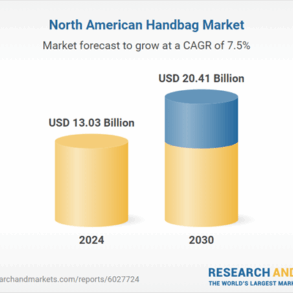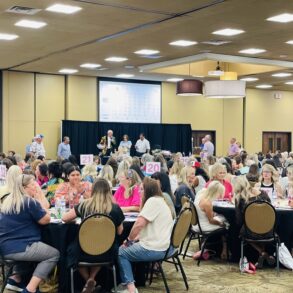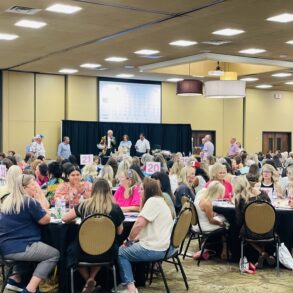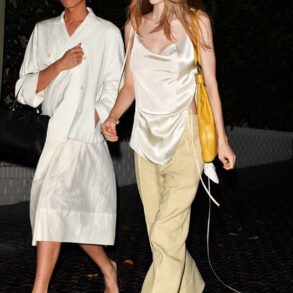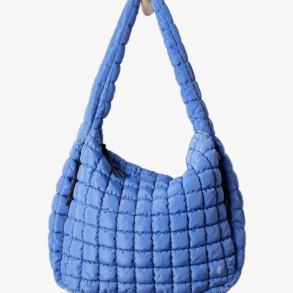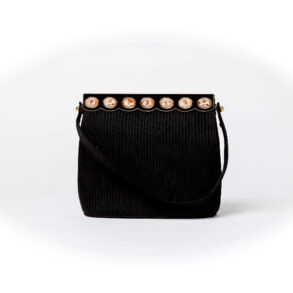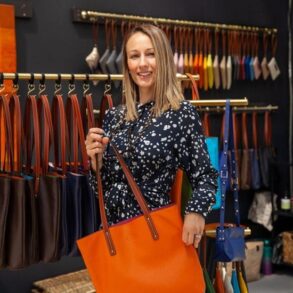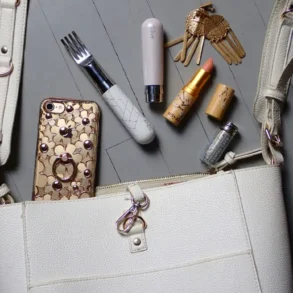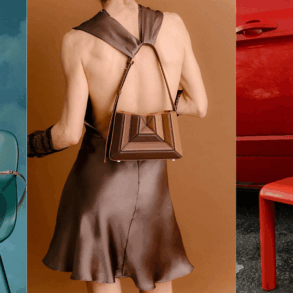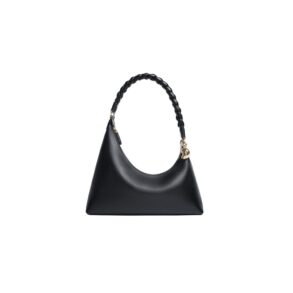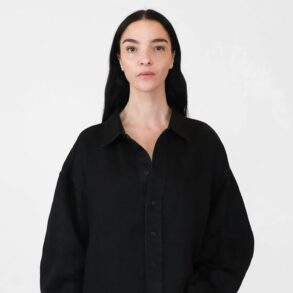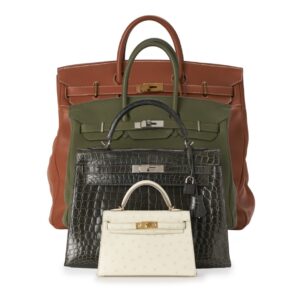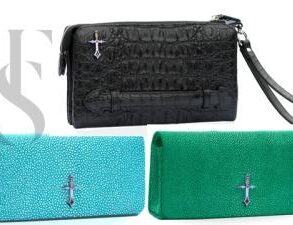It began in the dead of winter, holed up inside a tiny, uninsulated attic near a Ranger training camp in Dahlonega, Georgia.
It was 2011, and friends and fellow military spouses, Lisa Bradley and Cameron Cruse, had just charged $2,000 each to their credit cards to spring for a small batch of leather and canvas, as well as a commercial sewing machine that would eat up much of their already cramped and frigid attic workspace. But armed with these bare-bones supplies and a big idea, the two-woman operation launched what would become not just a business, but also a movement.
R. Riveter, now a wildly successful American handmade bag and accessories company, was born out of the mutual pain that had initially united Bradley and Cruse in friendship: the emotionally and financially defeating challenge of not being able to secure meaningful employment — despite their qualifications — due to the nomadic lifestyle of the military. Both women were highly educated, creative and full of grit. Yet neither was able to find work. Employer after employer turned them away.
If job-hunting misery loves company, there was more than enough to fill the ranks, the friends soon discovered after talking with other spouses and digging into employment data. In 2011, 57% of military spouses did not work outside the home.
“We were starting to see that if we wanted a career in this transient military life, we’d have to create it for ourselves,” said Bradley. “Not only did we need flexible income, but we needed mobile income to travel along with us as we relocated with our military members. And that’s when R. Riveter was born.”
Shining a light on the “unpaid shadow force”
As of 2025, there are approximately 1 million military spouses supporting service members in the US. Known as the “unpaid shadow force” behind those volunteering to serve the country in the military, the nation’s military spouses still face employment hurdles associated with the constraints of moving, cost of caregiving, and flexibility required to balance family obligations when a servicemember is away.
Current data shows the unemployment rate among military spouses remains high: an estimated 21%, a figure roughly five times greater than the national unemployment average. What’s more, the unemployment rate among active-duty military spouses has remained statistically unchanged for more than a decade.
In other words, the issue Bradley and Cruse recognized among their fellow military spouses in 2011 has largely not improved. But what the fledgling business partners recognized then — and what continues to move the employment needle bit-by-bit (and stitch-by-stitch) — is the tremendous upside to providing military spouses flexible, work-from-home opportunities.
Always ahead of her time, Rosie the Riveter goes remote
A cultural icon representing the women who worked in factories and shipyards during WWII, Rosie the Riveter embodies patriotism, strength and the ultimate housewife hustle. At R. Riveter, the founders set out to honor Rosie’s legacy in both name and industrious spirit.
“From day one, R. Riveter has stood for opportunity — creating meaningful jobs for military spouses, no matter where duty calls,” explained Bradley. “Through a distributed manufacturing model, we’ve employed remote Riveters across the country to handcraft our signature handbags and accessories. Every piece is a testament to resilience, hard work and a shared commitment to uplift others.”
From Washington state to Ohio to Florida, a network of military spouses — known as “Riveters” – cut and sew individual parts of the bags from home and then ship them back to the company’s headquarters in Southern Pines, North Carolina, where the pieces are then assembled in a warehouse. The finished products are finely crafted handbags often made from upcycled surplus military materials, such as retired uniforms, tents and wool blankets, which helps keep costs low while ensuring quality and durability.
By decentralizing the manufacturing process, the R. Riveter business model provides mobile, flexible income — not to mention autonomy, financial independence and a creative outlet — to the remote Riveters, as they move across the country, often every 2-3 years, in support of their service member spouses.
Handbags with the strength to carry the weight of a mission
Following a 2016 appearance on “Shark Tank,” where the co-founders received a $100,000 investment from billionaire Mark Cuban, product demand soared, but the company’s commitment to empowering military spouses via flexible, mobile work has remained the unwavering business driver.
With current products ranging from $38 mini pouches and $128 nylon backpacks to $300 tanned leather satchels worthy of “it” bag status, shoppers can order merchandise online or head to the R. Riveter flagship store in Southern Pines, North Carolina.
“We believe that when the work needs to get done, we can be the one to do it,” said Bradley, a fierce champion of encouraging other women to pursue their dreams. “When you are faced with the challenges of the unknown, with an uphill battle, ask yourself: What would Rosie do?”
The answer, said Bradley: “Girl, throw your hair up and get after it.”
Honoring National Military Spouse Appreciation Day 2025
In recognition of Military Spouse Appreciation Day, we caught up with Lisa Bradley, the CEO and co-founder of R. Riveter, as well as her colleague, Laura Vien, the company’s retail director and brand spokesperson, to chat about everything from fostering a woman’s sense of identity to school drop-offs and messy buns.
Below is an excerpt from our Q&A:
AOL: First, happy National Military Spouse Appreciation Day!
Thinking back to the days before the first R. Riveter bag was stitched, was there a turning point or an “aha!” moment that made you realize you wanted to devote yourselves to supporting and empowering the community of military spouses?
Lisa Bradley: There was a moment early in my journey as a military spouse when I knew something had to change. The constant cycle of moving every 2–3 years made it nearly impossible for military spouses to pursue traditional employment. It felt counterintuitive — that serving our country meant sacrificing career stability for the entire family.
I vividly remember arriving at our second duty station, full of hope and eager to connect. At one of the first spouse meetings, the room buzzed with energy. Everyone was talking about applying for jobs and what they hoped to find in this new chapter. But by the next meeting, the tone had completely shifted. One by one, they shared how they had stopped applying — no one would hire them.
It was a staggering moment. I realized this wasn’t just my struggle. It was a widespread, systemic issue. And it needed a solution.
Laura Vien: My “aha” moment came after a PCS move, when I had just left my job as a Health Physicist and found myself in a new town, newly married, with no friends, no family, searching for purpose. I remember flipping through a local magazine and reading an article about R. Riveter and a military spouse who struggled with employment — and it hit home. The challenges, the sacrifices, the lack of opportunity — it was my story. I immediately messaged the R. Riveter Instagram and said, “I can sew, you should hire me.”
At the time, the company had just moved to the area, still very small, but the connection I felt with the women behind it was immediate. That moment marked the beginning of a journey — not just for a job, but for a calling to help build something that would empower others like me.
AOL: Of all the products you could have launched, why bags? What made you decide that creating handmade, high-quality bags was the entrepreneurial avenue where you would direct your talents, passion and resources?
LB: We chose to focus on bags because they’re more than just accessories — they’re deeply personal. Unlike clothing, which changes day to day, a bag is something you choose intentionally and carry with you through whatever the day holds. It had to be strong enough to carry the weight of a woman’s mission, while also carrying the stories of the women who made it.
AOL: What would your 2025 self tell your 2011 self, as she was just starting out in a tiny attic with a sewing machine and a big idea?
LB: “You have no idea how hard this is going to get … but it’s going to be worth every second.” I’d tell her that the late nights, the trial and error, the moments of doubt — they’re all part of building something real. That what she’s starting will go on to impact hundreds of military families, spark thousands of meaningful conversations, and become more than just a business. It will become a mission.
Most of all, I’d say: “Keep going. You’re not just stitching fabric. You’re stitching stories, futures, and strength into every single bag. And one day, you’ll look back and be proud you never gave up.”
AOL: Each of your handbags tells a deeply personal story — especially those in your Heirloom collection, which encourages shoppers to send in a loved one’s uniform, blanket, duffel bag or other keepsake material to create a personalized bag with memories of them all over it. Can you share a personal story of a specific Heirloom creation that especially moved you?
LB: One Heirloom story came from the wife of a West Point colonel. She reached out and said she had his West Point wool blanket but couldn’t decide which of their four daughters to pass it on to. When she discovered our Heirloom Program, it gave her the perfect solution: She transformed the blanket into four large bags — one for each daughter — and zipper pouches for her grandchildren. It was a beautiful use of something so meaningful, but what truly moved me was how her daughters responded. One told me she carried her Heirloom bag to the hospital when she gave birth to her child. Another brought hers to a big job interview. Both said it gave them comfort, like a piece of their dad was with them during life’s big moments. That was the moment I realized we weren’t just making bags. We were creating bridges between generations, stitching strength and love into something tangible.
AOL: Parents aren’t supposed to play favorites with their children, but we’re hoping that’s not the case with handbags. As the mothers of invention behind R. Riveter, what’s your favorite handbag in the current collection?
LB: I’m sure my current life phase has a lot to do with it. Now that my kids are hitting double digits, I’m not hauling snacks, juice boxes and random action figures everywhere I go. I’ve graduated to the all-leather, grown-up bag that makes me look like I have it together — even if my hair is in a messy bun and my brain is in a constant tug-of-war between wife, mom and CEO mode.
The Eleanor says, “I’m here for business” while I’m internally screaming “Did I pack lunch? Did I send that email? Whose practice is tonight?” It’s sleek, structured and professional — basically everything I aspire to be before 9 a.m.
LV: If I had to choose, the Mattie is my favorite. Not just because it’s functional and adorable, but because of the name. It’s spelled exactly like my daughter’s name, and the bag itself is named after Mattie E. Knight, a pioneering female inventor. Here’s the wild part: Mattie E. Knight was also my grandmother’s exact name, which is who I named my daughter after. So every time I carry that bag, it feels like this full-circle moment — legacy, innovation and family all wrapped up in one.
AOL: Finally, we couldn’t possibly interview handbag makers without asking the most obvious — and unquestionably the nosiest! — question of all: What’s currently inside your handbag?
LB: A Fisher Space Pen — because who knows when you’ll need to write upside down, underwater or in a low-gravity crisis. And a rechargeable battery bank — because my phone lives at 1%, and chaos waits for no one.
LV: Oh, my bag is a whole ecosystem! I’ve got bags inside of bags inside of bags — no joke. Between soccer practices, school drop-offs, baseball games, running the store, and life in general, I carry everything. There’s my laptop, leftover Easter candy, zipper pouches filled with loose change, notepads, jewelry I ditched during the day at the flagship, hydration packets, handwritten notes and — of course — dog treats. We thought it’d be a great idea to adopt a puppy during one of the busiest times of our lives. Her name is Rosie, naturally.
This post was originally published on this site be sure to check out more of their content.



